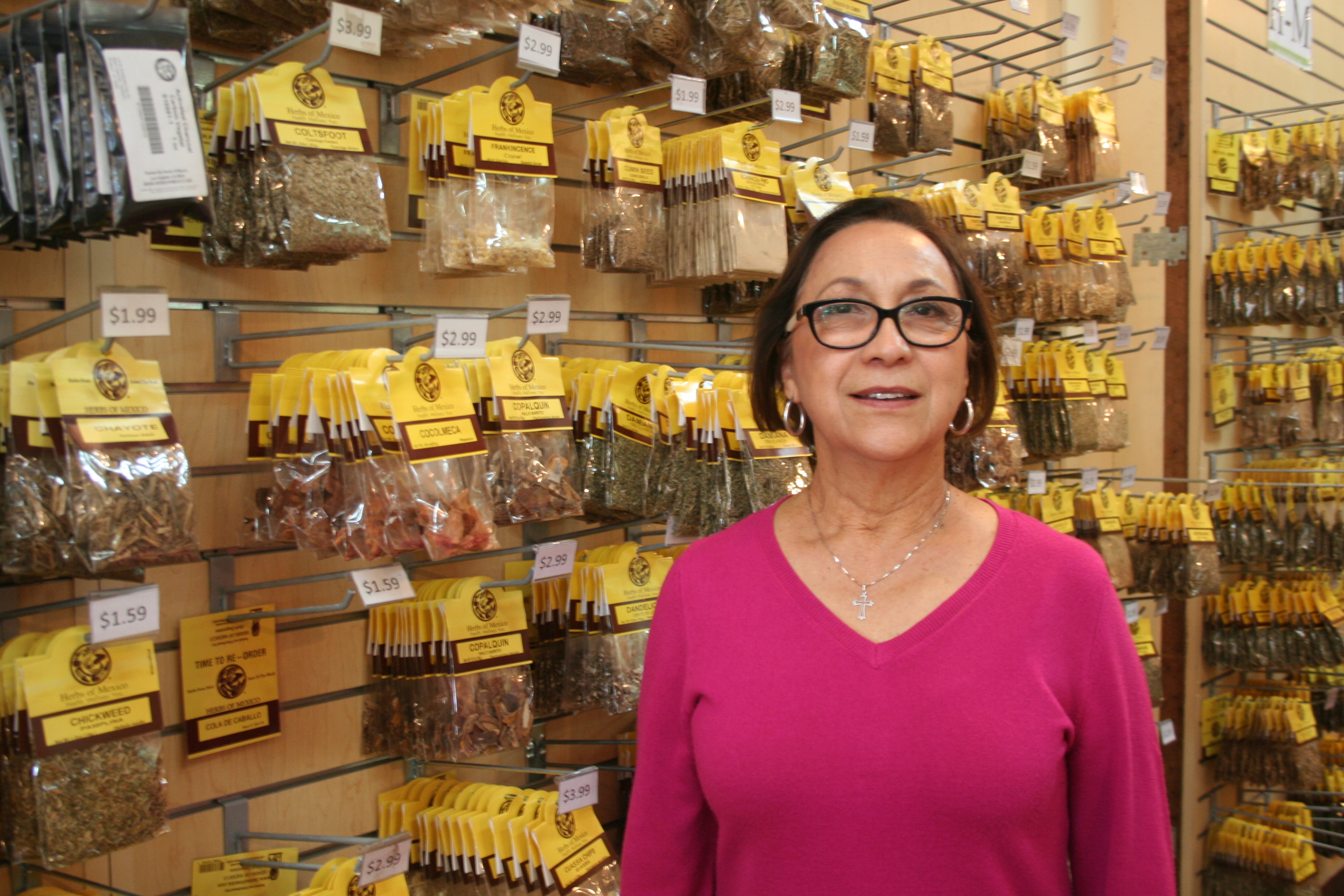[dropcap size=big]U[/dropcap]pon entering this shop, a tin dispenser with hot moringa tea greets customers. The walls are stacked with rows of dried herbs packed in plastic baggies. The section for arnica is empty, as it’s the most popular. Baskets of chia seed, flax seed, and herbs in packages lie in straw baskets at the front of the store. A group of people gather around the counter to ask the sales staff about the best remedy for common health complaints: high blood pressure, low energy, joint pain, a child’s cold.
For more than 50 years, Herbs of Mexico has helped keep the ancient practice of healing known as curanderismo alive in East Los Angeles. Herbs of Mexico carries natural products that originate from various parts of the world including, some 200 herbs from across Latin America.
Its longevity on a corner of Whittier Boulevard has faced many challenges since the Great Recession that knocked out many of its wholesale customers. The current housing crisis and rampant redevelopment has also priced out many of the botánicas in East Los Angeles that Herbs of Mexico once counted as clients. But Herbs of Mexico has been on a slow recovery thanks in large part to a growing interest in curanderismo as family matriarchs pass the knowledge down to the new generations.
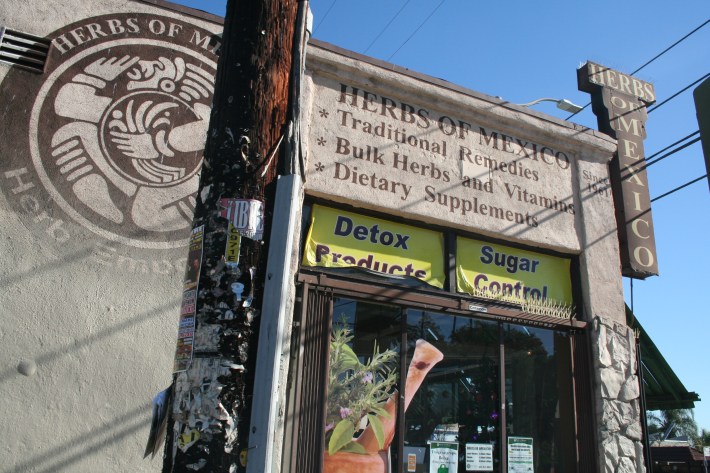
Origins
Morris Baker opened Herbs of Mexico in 1961. Baker, a Jewish man from East L.A., sold the business to George Cervilla, a Costa Rican immigrant who had a wealth of knowledge of medicinal herbs from Latin America. In 1980, Cervilla passed the business down to his sons, Roland, Alven, and Robert. After graduating from UCLA in 1991, Robert Cervilla enlisted Martin Lopez to modernize the business. Lopez took over ownership of the shop in 2006.
Lopez’s mother came from Cuba to the United States in 1961. Some of his first memories are of riding the bus with his mother and sister from Pico-Union to the shop in East Los Angeles. “I was six or seven, maybe eight years old,” Lopez told L.A. Taco. ”We were coming throughout the years – in middle school, and high school – and became very friendly with the owners of the business.”

Lopez said his mother would buy manzanilla, also known as chamomile, as a tea for her children’s stomach aches. She would get ruda and arnica for her own pain caused by arthritis. Eventually, the family got a car, and Lopez would drive from the Valley to take his mother – who by then was wheelchair-bound – to East Los Angeles for an herb shopping trip.
Lopez is now teaching his three children – who are 10, seven, and six – the benefits of eucalyptus oil when they have colds. He says that pouring a bit of eucalyptus oil into a running shower helps them to breathe better when they are congested.
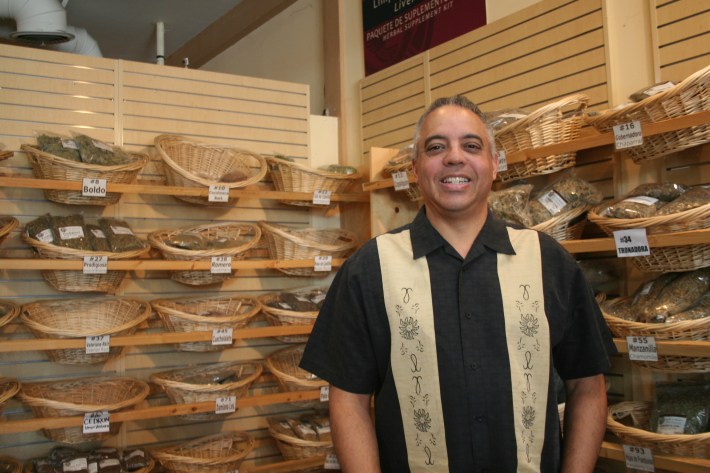
Evolution
Much has changed Since Lopez took over the store. “What you see now is very different from what we had before,” he said on a recent day.
What was once a small storefront with a crowded counter has expanded for customers to be able to walk around a shop with shelves sectioned by different ailments: herbs for pain and inflammation, calming herbs (passionflower and valerian), herbs to address women’s health issues such as menopause, and to relieve cold symptoms.
Lopez also switched from having customers scoop and pour their own herbs to pre-packaged dried herbs for easier tracking and to keep the place dust-free. Herbs of Mexico also became a registered facility with the Food and Drug Administration.
“Years ago people pulled their plants from the neighborhood and came in and sold them. Now we’re more sophisticated. We have distributors who have the right certifications of what the herb is, and is not contaminated. When you have those certified, it does cost more, price goes up,” he explained.
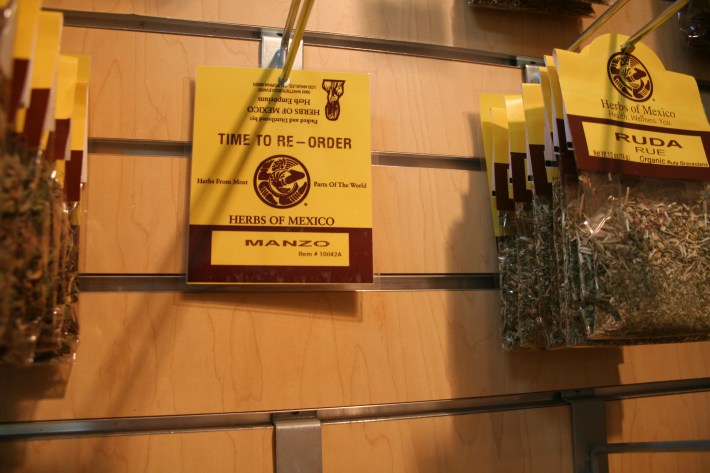
Another move Lopez made was to make the business follow sustainable practices. Herbs of Mexico no longer carries animal based products such as shark cartilage, and doesn’t source herbs whose harvesting is harmful to the environment.
At one point, Lopez opened Herbs of Mexico in Fontana. “It was open for five years, but we had to close it down after the recession,” said Lopez. Then in 2012, Herbs of Mexico opened a Huntington Park location, where, like East L.A., curanderismo is being passed down to new generations.
“Because of the demographics and the history behind the community, we are filling the need for their tradition,” explained Gloria O. Lerma, Herbs of Mexico’s assistant general manager. Lerma told L.A. Taco that their clientele is mostly women who are usually caretakers for their families.

[dropcap size=big]A[/dropcap]side from the popular herbs, the shop also carries herbs that are traditional in Mexican healing practices, like tepezcohuite, a tree whose bark is used to treat wounds and burns. There is also the swamp root, yerba mansa or raíz del manso, which is used in baths and teas to soothe achy joints. The root grows in the wetlands of southwest and northern Mexico.
The shop also carries copal, sage, and frankincense, but that is the extent of what they offer that is on the more esoteric side. “We’re not going to recommend something that’s going to make you rich or bring your husband back,” Lerma said.
Lopez said the culture of healing has been good for business but that shop’s identity remains tied to the basics. “We never sold any of the candles, you know, las veladoras,” he noted. “That is part of the complete culture to healing – the spiritual component, along with the physical component. We’ve been asked if we carry them, but you can easily buy that somewhere else. Our specialty is herbs.”
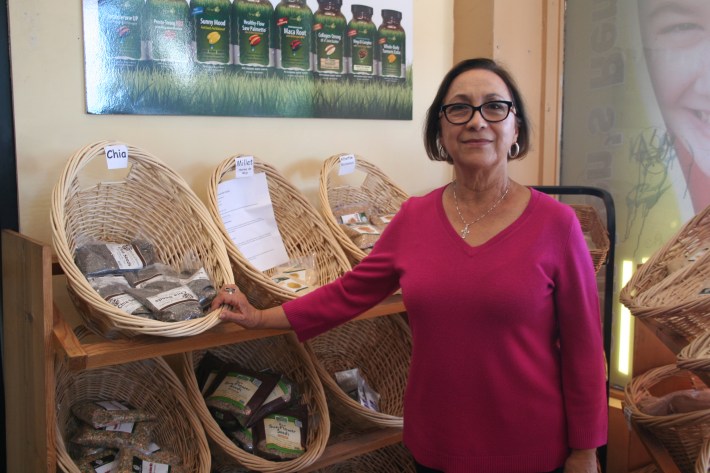
New Obstacles
Herbs of Mexico also faces challenges that stem from the renewed interest in the ancient benefits of herbal medicine. Popular herbs such as manzanilla are now readily available at supermarkets, chain health food stores, and fly-by-night sellers in downtown’s Wholesale District.
According to Lopez, the rise in demand has led to a growth of sub-bar supply.
“The products out there in the callejones, the allies, aren’t tested like ours,” Lopez said. “And they are making exorbitant claims like, ‘If you take this, you’ll lose weight.’ They don’t go through the process that we do, to sterilize our herbs. We have a thread or chain to trace back our herbs in case there’s a recall.”
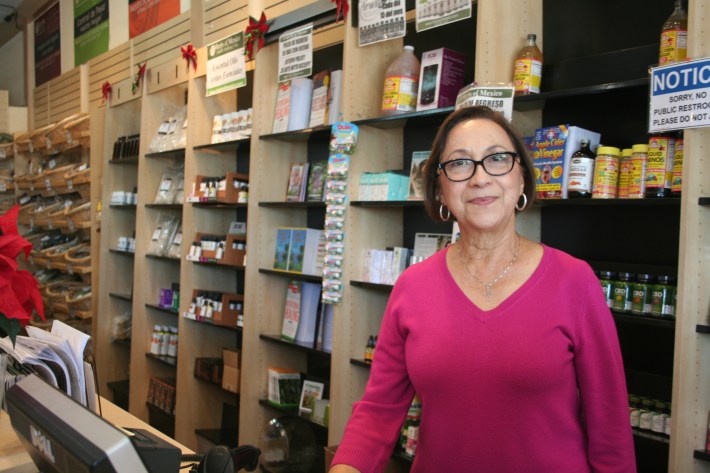
The staff will take the time to answer questions and explain how an herb works, according to Lerma. At the front of the store is literature in English and Spanish on nutrition and herbs.
In the future, Lopez said he would like to open Herbs of Mexico in the San Fernando Valley and Santa Ana but his main focus is making sure that the original shop remains open for the residents of East Los Angeles.
“We have the knowledge. We have the personal touch,” Lerma said.
RELATED: Hot and Cool Cafe ~ In Leimert Park, A Coffee Shop Builds Community Bonds
